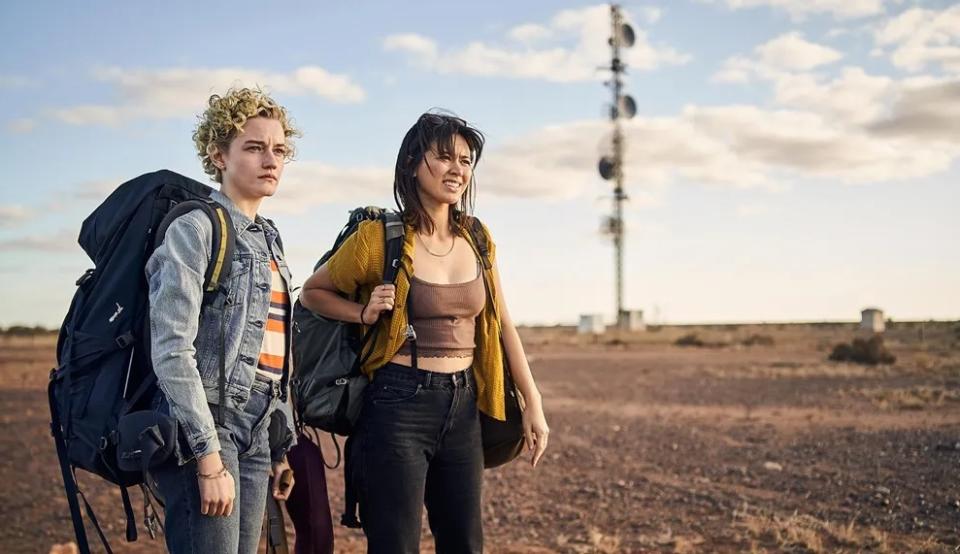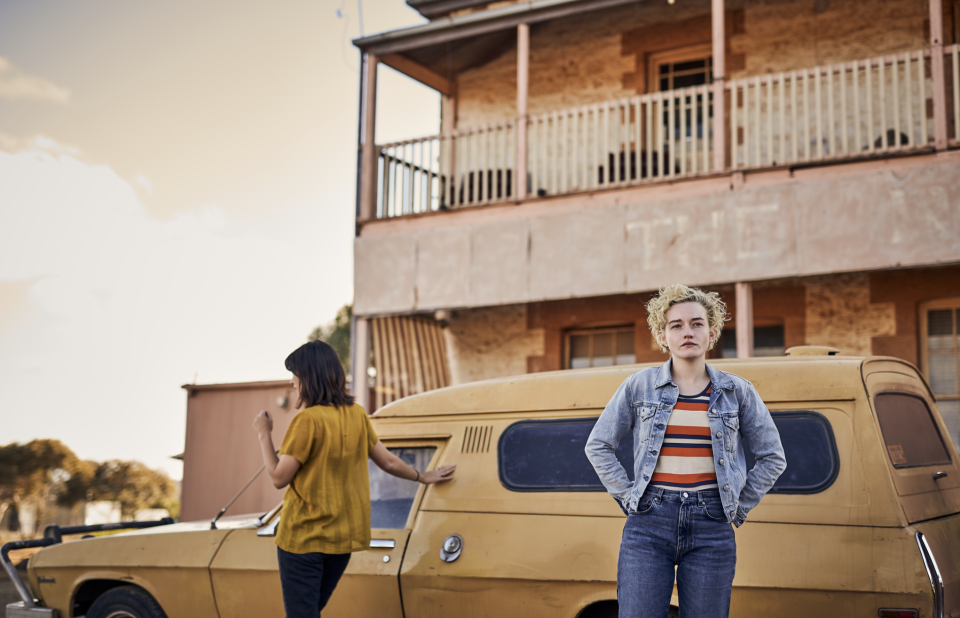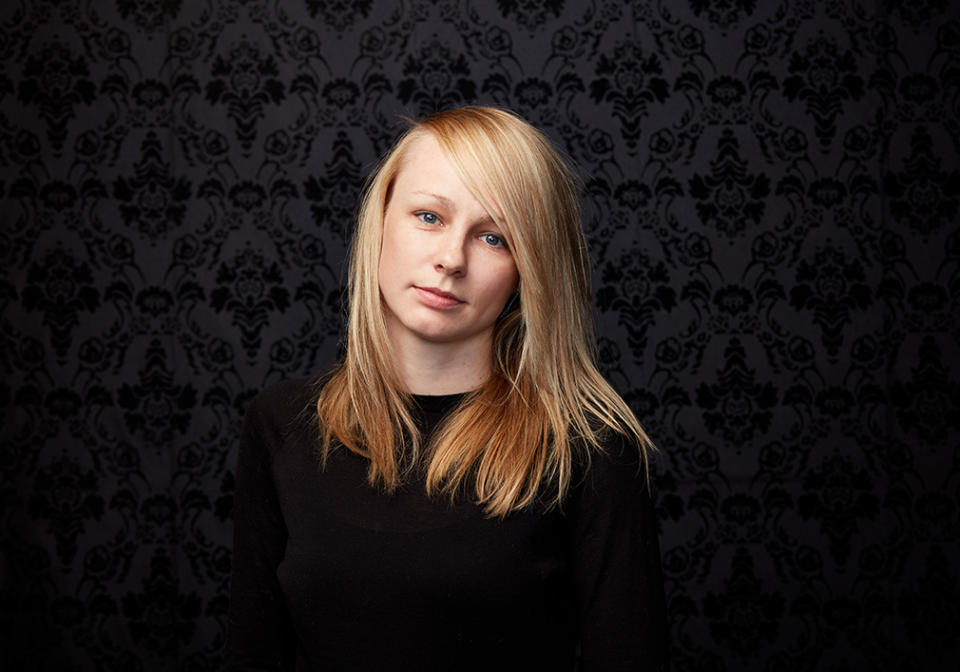Director Kitty Green Was Shocked by How Americans Reacted to Her ‘The Royal Hotel’

- Oops!Something went wrong.Please try again later.
- Oops!Something went wrong.Please try again later.
It’s the location. When backpackers Hannah and Liv (Julia Garner and Jessica Henwick) get off the bus in the middle of nowhere in Kitty Green’s sophomore narrative film “The Royal Hotel,” you see the Outback in all its rugged splendor. And terror.
One look at their destination, a seedy two-story Royal Hotel with a pub for them to bartend each night, and you fear these two women are not going to come to a good end. The girlfriends are taking a brief detour from their Australia vacation to earn some extra cash. Their job: to handle a rowdy pub full of drunk and randy miners. These hardy travelers think they’re up to the task, but Hannah is a tad more wary than Liv. She drinks a little less, keeps an eye out, and when push comes to shove, as it inevitably does, picks up an ax.
More from IndieWire
Playing well to audiences and critics in Telluride and Toronto, “The Royal Hotel,” out this week from Neon, is a smart, taut thriller from documentary-turned-fiction director Green (“Casting JonBenet”), a more ambitious follow-up to “The Assistant” (2019), which featured Garner and a Xerox machine for 90 minutes.
The filmmakers found the perfect abandoned hotel two hours North of Adelaide. “I wanted one of those grand two story pubs,” Green told IndieWire during a recent Zoom interview. “It was important that you could sense its history, just from looking at the place. I wanted to get a sense that the royal family had once visited. And since then it has fallen apart a little bit. We were looking for a barren landscape, a mining town, because mining towns are industry towns, people fly in to do those jobs from all over Australia. So we needed dusty, barren nothingness all around that place.”
The movie was inspired by a documentary, “Hotel Coolgardie,” which Green watched while on a film festival jury in Australia, about two Scandinavian girls who are working in an Outback pub. “I’d never seen the Outback represented in that way,” she said, “through this female lens. I thought that was fresh. It was the right jumping off point for a screenplay.”
Australian production company See-Saw Films (“The King’s Speech,” “The Power of the Dog”) agreed, and backed Green’s adapting that story. “And I started building this screenplay based on that, knowing it would be a good role for Julia [Garner].” As the filmmakers headed into production, SeeSaw needed some gap financing and sold North American distribution rights to Neon.

Australia’s storied macho culture is not what the movie is about, said Green: “All the events that happen in that movie could happen in a bar in midtown Manhattan. It’s about alcohol-fueled aggression, that behavior that when left unchecked, can spiral into something quite terrible. And the film is about what we tolerate, what we permit, what we put up with as women in those situations. And when do we stand up for ourselves, when do we say ‘no,’ and when do we bring out the ax?”
In the documentary, the Scandinavian women didn’t put up with the behavior that they saw, said Green: “They were able to say, ‘Hang on! That’s not right. You can’t say that to me.’ They were able to say, ‘No.’ As Australian women, we’ve learnt to just go, ‘You know, he’s all right, it’s OK.’ And just put up with it.”
That culture clash compelled Green to put two American women into the noisy pub, to see what would happen. “When you bring in a different culture, these girls are calling out the behavior that Australian women would put up with,” she said. “It is a way of looking at what’s right and wrong, and what should we deal with? So I think it’s a conversation we need to have in Australia. I’m not going to just say it’s only Australia’s problem, because the same thing happens in college dorm parties in the U.S. So it’s about those moments: where do you draw the line? Dancing on that line was interesting to me.”

While two vulnerable women and a remote pub full of drunken miners seems a perfect set-up for a suspense thriller, “weirdly, it’s a very common thing,” Green said. “In order to extend your visa in Australia, there’s two choices: You can work in a remote pub, or you can pick berries. You head to the Outback and there’s a Dutch woman serving you beer at a bar. Australians are used to that idea, so it’s funny watching an American audience, they’re [thinking], ‘What are they doing there?’ And Australians go, ‘That makes sense.'”
Green added, “Australians understand the character of Liv because she is more Australian in that way. The pub is not a scary place for an Australian audience. And for some reason, Americans [are scared] as soon as Hugo Weaving enters. Whereas in Australia, it takes an extra maybe 30 minutes for it to feel like a horror movie because that pub doesn’t feel threatening to an Australian audience. It feels like a pub, and Hugo is the pub owner, and, ‘there’s a guy and he’s a little dodgy, but he looks alright.’ It plays really differently where I’m from.”
When the veteran Australian Weaving (“The Lord of the Rings,” “The Matrix”) agreed to play the owner of the Royal Hotel, Green was relieved. “We were looking for not just a brilliant actor,” she said, “but someone who was a gentle soul who could captain our ship in a lot of ways. There’s a lot of men in those [bar] scenes, so it’s nice to have someone like Hugo around because everyone listens to him, respects him. He created a lovely atmosphere on that set.”
Directing those crowded pub sequences was a challenge. “Often, there’s 14 speaking roles in a particular shot,” she said. “It’s a lot of egos and everyone wants to know, after a take: ‘Oh, when I put my sunglasses up and down, do you like that?’ I didn’t even see that, I’m watching the other six people in front of you. So it’s figuring out a way to make everyone feel seen and appreciated, but also trying to concentrate on what you need to concentrate on. It’s a balancing act.”

Directing television, besides paying the bills between projects, helped Green to absorb the skills she needed to handle those scenes. While directing two episodes on AppleTV+ series “The Servant,” “M. Night Shyamalan taught me a lot about a vibe on set,” she said. “But technically, I learned so much from doing a big dinner party scene with seven or eight people. And I’d never done that kind of coverage before where you’re trying to figure out technically how to get these moments and make sure nothing’s missed. If you want to learn a little bit about tension, he’s the guy to go to.”
On “The Royal Hotel,” ratcheting up the tension was a subtle thing for Green: “We’re playing with: ‘Am I safe? Or am I not? Is that a joke? Or a threat?’ At what point do we pick up the ax?”
It was also important for Green to keep the women’s back stories ambiguous, to not hit their psychological weaknesses on the head. “We had a lot of those discussions in pre-production,” she said. “I could have added more lines in; I’m sure some audience members want that. Also, I didn’t want it to be a rape/revenge movie. I didn’t want to talk about some prior trauma. If you could label them as ‘X happened to them, so therefore they’re angry, this is the way they’re behaving,’ that would have been a cheap way out. I wanted to make a film about this behavior right here. Is this acceptable? Or is this not? And when do we stand up for ourselves?”
Having missed theater showings for “The Assistant” during the pandemic, Green was thrilled to watch “The Royal Hotel” not only in Telluride but at Toronto’s massive Roy Thomson Hall. “You can see audiences get behind [Garner] and they cheer when certain things happen,” she said. “And that really excites me.”
Next up: Green is on the promo trail, without much writing time. She’ll show more Australian audiences the movie at SXSW Sydney, the first SXSW in Australia, in the middle of October.
Best of IndieWire
Where to Watch This Week's New Movies, from 'The Exorcist: Believer' to 'Dicks: The Musical'
The Best Thrillers Streaming on Netflix in October, from 'Fair Play' to 'Emily the Criminal'
Sign up for Indiewire's Newsletter. For the latest news, follow us on Facebook, Twitter, and Instagram.

